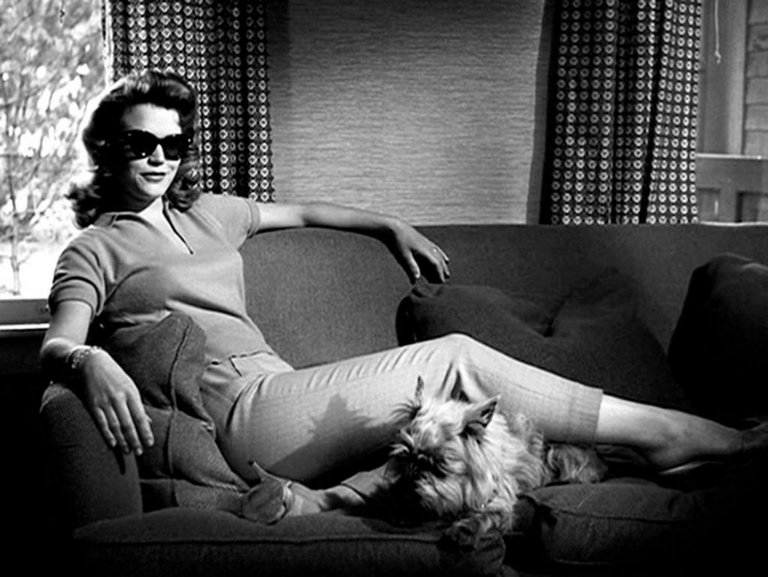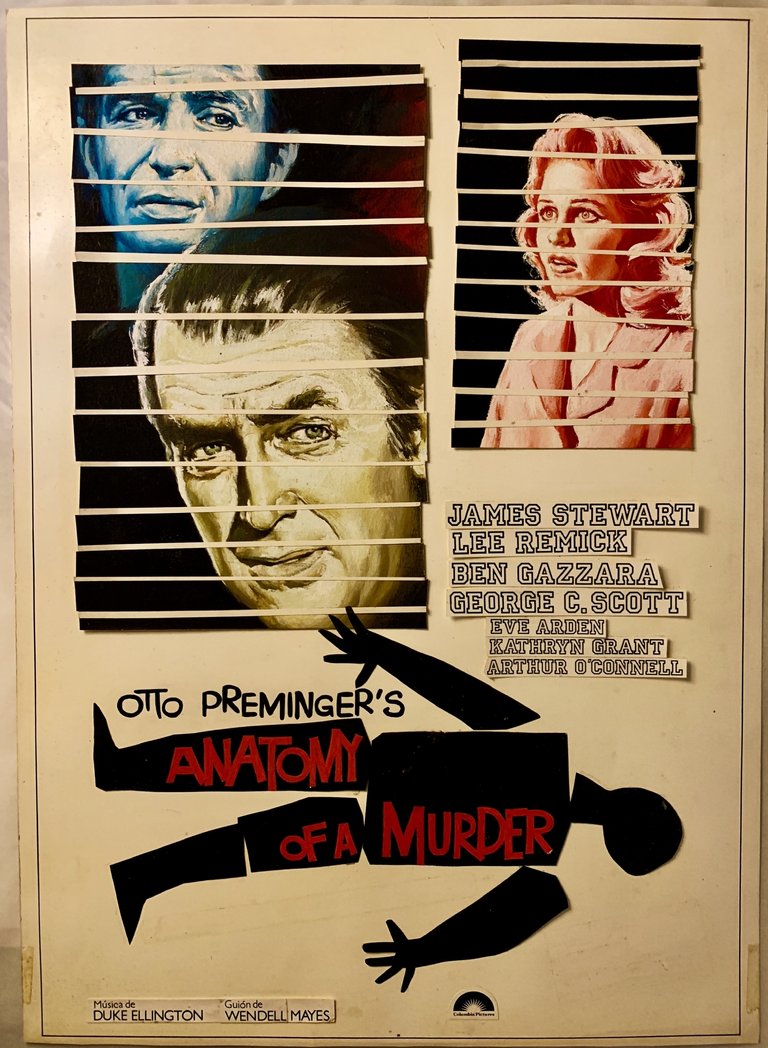Anatomy of a Murder (1959): does justice really seek the truth? | ¿en verdad la justicia busca la verdad?

Uno de los dramas judiciales más famosos de la historia del cine
Anatomy of a Fall was one of my favorite movies from last year and I remember when I saw the poster for the first time I thought the title sounded familiar from somewhere. Then I saw a retro-style promotional poster that I thought I'd seen somewhere else, but it wasn't until two nights ago that all the pieces fell into place and I knew where I'd seen the poster and why the title had such a familiar resonance for me.
Anatomy of a Fall fue una de mis películas favoritas del año pasado y recuerdo que cuando vi el poster por primera vez pensé que el título me sonaba de alguna parte. Después llegué a ver un poster promocional en estilo retro que me parecía haber visto en otro lado, pero no fue sino hasta hace dos noches cuando todas las piezas encajaron y supe dónde había visto el afiche y por qué el título tenía una resonancia tan familiar para mí.
Anatomy of a Murder is a 1959 courtroom drama, written and directed by Otto Preminger (Exodus, Angel Face, The Man With the Golden Arm), starring James Stewart (Vertigo, It's a Wonderful Life, Rear Window) and with the soundtrack by none other than Duke Ellington (who also makes a cameo in the film). The movie, based on the novel by Robert Traver, tells the story of Paul Biegler (Stewart), a lawyer who left the position of prosecutor ten years ago and who now practices law independently and almost precariously. He goes out fishing and wanders around more than he actually works. Therefore, when a potential client appears who requires his defense in court, Paul decides to take the case, even though he first has to make some inquiries. The accused is Frederick Manion (Ben Gazzara), an army lieutenant who murdered a bar owner after he raped his wife Laura (Lee Remick). The case could not be simpler for the prosecution and more complicated for the defense: self-defense cannot be claimed; the way the events occurred point to premeditation; and finally, rape (which would have to be proven) is not a reason to murder a man because the lieutenant has been able to call the authorities, so we wonder how Biegler is going to save his client from jail and how is Preminger going to fill the 160 minutes of the film? Well, in an ingenious way, there is no doubt about that.
Anatomy of a Murder es un drama judicial de 1959, escrito y dirigido por Otto Preminger (Exodus, Angel Face, The Man With the Golden Arm), protagonizada por James Stewart (Vertigo, It's a Wonderful Life, Rear Window) y con la banda sonora a cargo de, nada más y nada menos que, Duke Ellington (que además hace un cameo en la cinta). La película, basada en la novela de Robert Traver, cuenta la historia de Paul Biegler (Stewart), un abogado que dejó el cargo de fiscal hace diez años y que ahora ejerce el derecho de forma independiente y casi precaria. Es más lo que sale a pescar y vaga por ahí que lo que trabaja realmente. Por eso, cuando aparece un potencial cliente que requiere su defensa en la corte, Paul decide tomar el caso, aunque antes tenga que hacer algunas averiguaciones. El acusado es Frederick Manion (Ben Gazzara), un teniente del ejército que asesinó al dueño de un bar después de que éste violara a su esposa Laura (Lee Remick). El caso no podría ser más sencillo para la fiscalía y más complicado para la defensa: no se puede alegar defensa propia; la forma en que ocurrieron los hechos señalan premeditación; y finalmente la violación (que habría que demostrar) no es motivo para asesinar a un hombre porque el teniente ha podido llamar a las autoridades, así que nos preguntamos ¿cómo va a hacer Biegler para salvar a su cliente de la cárcel y como va a hacer Preminger para llenar los 160 minutos que dura la película? Pues, de una forma ingeniosa, de eso no hay duda.

As the trial progresses we will discover secrets, motives, doubts will assail us, but above all our trust in the judicial process and in the institutions in charge of administering justice will suffer. Manion is guilty, he can't possibly go free, right? A part of us defends this premise, and wants him to be convicted, but the other wants the hero - Paul Biegler - to triumph in the trial, how is that possible?
A medida que avanza el juicio iremos descubriendo secretos, motivos, nos irán asaltando las dudas, pero sobre todo se resentirá nuestra confianza en el proceso judicial y en las instituciones encargadas de administrar la justicia. Manion es culpable, no es posible que salga libre, ¿cierto? Una parte de nosotros defiende esta premisa, y quiere que lo condenen, pero la otra quiere que el héroe - Paul Biegler - triunfe en el juicio, ¿cómo es posible?
What I love about courtroom dramas on screen is precisely what I hate about real-life justice: it's not so much about the search for truth as it is about what each situation seems to be. If justice sought absolute and unquestionable truth alone or above all else, Manion should be condemned without the need for a trial. He murdered a man, confessed and turned himself in. Perhaps there are some circumstances that could increase or decrease his sentence, but he is guilty, there is no doubt about that. However, for Biegler there's a possible way out and like many other lawyers we have seen on and off the screen, he will manage to show the truth in another way, so that he can convince the jury of what is best for him to they believe. To do this he has the help of his secretary, the efficient and faithful Maida (Eve Arden) and his friend Parnell Emmett McCarthy (Arthur O'Connell), an Irish lawyer who is older than Paul and who lately has been more addicted to booze than to the exercise of law. However, one of the most difficult obstacles to overcome is on his side of the court and is the easygoing and flirtatious character of Laura, the lieutenant's beautiful and young wife. At times it's as if her husband is not on trial, or as if she has not been raped. She's smiling, reckless, seductive, she dresses flashy, is she hiding something? Did things really happen as Paul was told?
Lo que amo de los dramas judiciales en la pantalla es precisamente lo que detesto de la justicia en la vida real: no se trata tanto de la búsqueda de la verdad como de lo que cada situación parece ser. Si la justicia buscase la verdad absoluta e incuestionable únicamente o por encima de todo lo demás, Manion debería ser condenado sin necesidad de juicio. Asesinó a un hombre, confesó y se entregó. Quizás hay algunas circunstancias que pueden aumentar o disminuir su condena, pero es culpable, de eso no hay duda. Sin embargo, para Biegler hay una posible salida y al igual que muchos otros abogados que hemos visto dentro y fuera de la pantalla, se las ingeniará para mostrar la verdad de otra forma, de manera que logre convencer al jurado de aquello que le conviene que crean. Para ello cuenta con la ayuda de su secretaria, la eficiente y fiel Maida (Eve Arden) y su amigo Parnell Emmett McCarthy (Arthur O'Connell), un abogado irlandés de mayor edad que Paul y que últimamente ha estado más entregado al alcohol que al ejercicio del derecho. Sin embargo, uno de los obstáculos más difíciles de superar está en su lado de la cancha y es el carácter desenvuelto y coqueto de Laura, la hermosa y joven esposa del teniente. Por momentos es como si su esposo no estuviera siendo juzgado, o como si no la hubieran violado. Se muestra risueña, temeraria, seductora, se viste de forma llamativa, ¿está ocultando algo? ¿en realidad las cosas sucedieron tal cual le contaron a Paul?

The other obstacle that Paul faces is not only that he must face the current prosecutor, an old acquaintance, but that the prosecution also has Claude Dancer (George C. Scott), a lawyer with great experience and the reputation of being one of the best at their job. And boy does he do it well. On more than one occasion he puts Manion, his wife, and Biegler himself against the ropes. The fight in the courtroom is on par with the rest of the film.
El otro obstáculo que se le presenta a Paul es no sólo que debe enfrentarse al actual fiscal, un viejo conocido, sino que la fiscalía también cuenta con Claude Dancer (George C. Scott) un abogado con gran experiencia y la reputación de ser uno de los mejores en su trabajo. Y vaya si lo hace bien. En más de una oportunidad pone contra las cuerdas a Manion, a su esposa, y al propio Biegler. La lucha en el tribunal está a la altura del resto de la película.
The film progresses little by little but steadily, at no time is there a gap in the plot nor does it give the impression that it has gone on longer than necessary. All the steps that Paul takes are necessary and the revelations of each witness add tension and some mystery to the story and the destiny of the characters. Anatomy of a Murder earned seven Oscar nominations (including best film and lead actor), four Golden Globe nominations and three BAFTA nominations, among many other nominations and awards (Duke Ellington won the Grammy for this soundtrack) and is considered one of the best films of the 1950s and one of the best courtroom dramas of all time. Two years earlier Witness for the Prosecution by Bill Wilder had been released and just three years later another judicial classic was released, the iconic To Kill a Mockingbird with Gregory Peck and that led me to think about other good judicial dramas that are highly recommended, both of that period as more modern, like the aforementioned Anatomy of a Fall, The Trial of the Chicago 7, Primal Fear, Argentina 1985, Philadelphia, A Few Good Men, The Veredict, which other do you remember? Have you seen Anatomy of a Murder? Do you like movies from the fifties? I read you in the comments.
La película avanza poco a poco pero de manera constante, en ningún momento se siente un vacío en la trama ni da la impresión de haberse alargado más de lo necesario. Todos los pasos que da Paul son necesarios y las revelaciones de cada testigo van agregando tensión y algo de misterio a la historia y al destino de los personajes. Anatomy of a Murder obtuvo siete nominaciones a los Oscar, (incluyendo mejor película y actor principal), cuatro nominaciones a los Globos de Oro y tres a los BAFTA, entre muchas otras nominaciones y premios (Duke Ellington se llevó el Grammy por esta banda sonora) y está considerada una de las mejores películas de los años cincuenta y uno de los mejores dramas judiciales de todos los tiempos. Dos años antes se había estrenado Witness for the Prosecution de Bill Wilder y apenas tres años después se estrenó otro clásico judicial, la icónica To Kill a Mockingbird con Gregory Peck y eso me llevó a pensar en otros buenos dramas judiciales super recomendados, tanto de esa época como más modernos, como la ya mencionada Anatomy of a Fall, The Trial of the Chicago 7, Primal Fear, Argentina 1985, Philadelphia, A Few Good Men, The Veredict, ¿cuál otro recuerdan ustedes? ¿han visto Anatomy of a Murder? ¿les gustan las películas de los años cincuenta? Los leo en los comentarios.
Reseñado por @cristiancaicedo
Other posts that may interest you | Otros posts que pueden interesarte:
  |
|---|




Oye,me paso lo mismo con el nombre de Anatomia de una caida!por alguna razon que no entendia a mi cerebro le parecia familiar y no entendia por que al ser una pelicula reciente,pero por tu post entiendo!
Realmente prefiero no tener ningun tipo de informacion de peliculas o series que no he visto para evitar pre conceptos y spoilers(sí,soy ese tipo de cinefila mamona xd)asi que descargare la peli y con calma leere tu reseña haha aunque lo que lei hasta ahora me gusto mucho,buen post y gracias por compartir!
Qué bueno que te llamó la atenció, espero la disfrutes. Saludos.
Oh I have to see this! A more noir perspective on the story. Surprised I didn't stumble across it a while ago when I was endlessly watching films from the 30s to 60s
There are so many great movies from those years! I'm sure you can name me a few of them. Thank you for reading my post.
Take a look through my letterboxd for some, I think I added some a few months ago.
https://letterboxd.com/namiks/
La verdad no quiere decir que sea la verdad verdadera. Un juez solo dilucida una verdad procesal dictaminada en razón de hechos, y elementos probatorios. La justicia es ciega, emite un dictamen en razón de una balanza y las leyes de cada país. Lo que puede hacer abominable aquí no quiere decir que sea así en otro lado. El film se ve interesante. :3